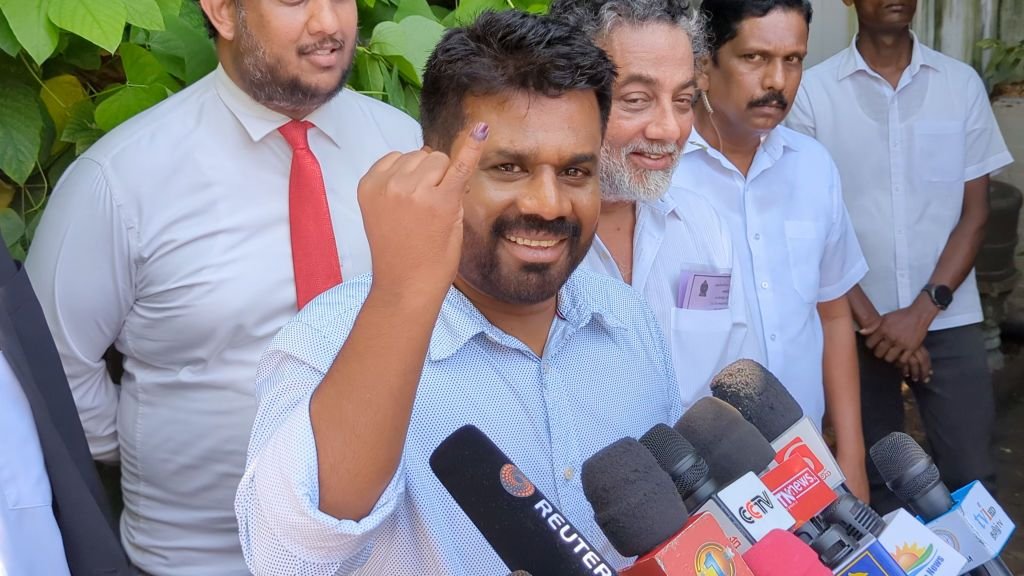Prologue to the Political Race Results
The new political race brings about Sri Lanka connote a surprising change in the country’s political scene, proclaiming the development of a left-inclining pioneer who has caught the public’s consideration and backing. The political environment paving the way to the political race was set apart by huge disturbance and discontent with the occupant government, fundamentally determined by financial difficulties and social distress. Citizen bafflement with customary ideological groups made a rich ground for the ascent of new initiative that adjusts all the more intimately with radical belief systems.
In this political decision, the significant gatherings incorporated the occupant party, which attempted to hold its elector base in the midst of far and wide analysis for its treatment of the economy and expectations for everyday comforts. In the mean time, the left-inclining party, which had recently been underestimated, effectively excited help by tending to the squeezing worries of the general population — like imbalance, joblessness, and the significant expense of living. Through a mission that underlined social government assistance, monetary change, and political responsibility, the recently chosen pioneer had the option to reverberate profoundly with electors who were longing for change.
The meaning of this electing shift couldn’t possibly be more significant, as it mirrors a more extensive change in elector opinion across Sri Lanka. Segment studies show that more youthful citizens, especially those disappointed with business as usual, assumed a vital part in pushing the left-inclining party to triumph. The political decision results articulate an unmistakable interest for strategies that focus on civil rights and impartial turn of events, denoting a turn from the more conventional, moderate methodologies that have ruled Sri Lankan legislative issues before. As the country leaves on this new political part, it turns out to be progressively vital to break down the ramifications of this leftward shift on administration and strategy making in Sri Lanka.
Profile of the New Pioneer
The recently chosen left-inclining head of Sri Lanka addresses a huge change in the political scene of the country. This pioneer, who has gone through years fabricating their political profession, rose through the positions with areas of strength for a to social value, natural manageability, and financial equity. Their process started in grassroots developments, where they partook in neighborhood activism pointed toward tending to variations in schooling and medical care access. This basic experience permitted them to interface profoundly with residents, grasping their difficulties and yearnings.
All through their profession, the pioneer plays held different parts, including filling in as an individual from parliament and later as a pastor responsible for social turn of events. These positions permitted them to carry out approaches zeroed in on neediness easing and social government assistance programs, procuring the trust of numerous citizens. Their key philosophies place on radical standards like the significance of aggregate haggling, interests out in the open administrations, and a solid administrative system for organizations to guarantee fair practices. The pioneer has reliably pushed for strategies that focus on the government assistance of the average workers, which resounded firmly during the new political decision.
As opposed to the previous administration, which kept a more neoliberal methodology, this new pioneer’s vision for Sri Lanka underlines a participatory model of administration that energizes resident commitment to policymaking processes. Their obligation to straightforwardness and responsibility is clear in their arrangements to lay out systems that consider public examination of government activities. This takeoff from customary practices intends to develop trust and cultivate a more comprehensive world of politics for all Sri Lankans.
As this left-inclining pioneer assumes the difficulties of administration, their effect on Sri Lanka’s financial texture will probably be significant. With an emphasis on evenhanded turn of events, there is potential for critical change in strategies that can help the country’s most weak populaces.
Ramifications of a Left-Inclining Government
The rise of a left-inclining government in Sri Lanka messengers critical changes in both social and monetary strategies. With an emphasis on work privileges, the new organization is probably going to advocate for worked on working circumstances, fair wages, and improved professional stability. Such strategies might engage laborers and worker’s organizations, empowering them to haggle better terms with managers. This shift could at last prompt a more impartial dispersion of riches, tending to the longstanding inconsistencies that have described Sri Lanka’s monetary scene.
Abundance rearrangement is one more possible focal point of a left-inclining administration approach, planning to handle foundational imbalances. Expanded tax collection on higher levels of pay and fruitful execution of social government assistance projects might elevate admittance to fundamental administrations like medical care and instruction. By putting resources into public government assistance, the public authority could make a wellbeing net for the distraught, in this way upgrading their personal satisfaction. This philosophy lines up with numerous worldwide left-inclining developments, which advocate for a common agreement that safeguards the weak in the public eye.
In any case, the change in administration will likewise impact Sri Lanka’s unfamiliar relations, exchange, and venture scene. While encouraging homegrown financial development, the new government could reconsider organizations with worldwide substances, potentially prompting a reorientation of economic deals. Such changes could lean toward countries with comparable political philosophies, possibly affecting unfamiliar direct venture inflows. Investigates from different areas, including business networks and unfamiliar financial backers, may arise, communicating worries over the unpredictability of strategy shifts and their drawn out manageability.
Allies of the left-inclining plan contend that these progressions are fundamental for creating feasible and fair monetary structures. They underscore that focusing on friendly government assistance can prompt a more comprehensive and versatile society. By the by, the ramifications of these dynamic strategies will require cautious examination to guarantee that the harmony between monetary development and social value is accomplished really.
Challenges Ahead for the New Organization
As the recently chosen left-inclining organization in Sri Lanka sets out on its administration process, it is defied with a heap of difficulties that could fundamentally influence its plan. One of the essential obstacles is inward party elements. A different alliance of liberal philosophies might prompt clashing needs among individuals. Exploring these distinctions will be fundamental to keep up with solidarity and guarantee successful arrangement execution. Assuming groups inside the party neglect to orchestrate their perspectives, it might bring about inefficacy and disappointment among allies, possibly subverting the new organization’s targets.
Besides, the organization will confront resistance from rival political groups that are probably going to vivaciously challenge its plan. These gatherings, addressing different constituents across the socio-political range, could profit by any slips up made by the new pioneer to electrify resistance feelings. The political scene could develop into a landmark where the new organization should continually safeguard its strategies, redirecting genuinely necessary consideration from administration to countering analysis. Building useful conversations with disagreeing gatherings could relieve possible showdowns, yet it requires vital exchange and tact.
Public assumptions present another critical test. Residents are confident about unmistakable upgrades following long periods of monetary and social disturbance, prompting a requesting air where the new organization is considered responsible for guaranteed results. Adjusting these assumptions while carrying out steady, foundational changes could demonstrate troublesome. Also, the squeezing monetary obstacles, including obligation emergency the board and expansion adjustment, further muddle what is going on. These financial variables request realistic arrangements that may not line up with the general changes at first imagined by the new pioneer.
In conclusion, cultural divisions, exacerbated by ethnic and philosophical partitions, could obstruct the organization’s endeavors to encourage public solidarity. The new administration should focus on compromise and construct a comprehensive political environment that values assorted points of view. Tending to these difficulties head-on with straightforwardness, correspondence, and joint effort is essential for the organization to accomplish its dynamic changes and encourage a brought together country.

